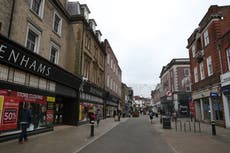Labour issues warning over the English high streets ‘most at risk of being hollowed-out by the pandemic’
Party says impact will be felt more deeply in certain parts of the country
Labour says it has identified the 20 places in England most at risk of ‘hollowed out’ high streets in the wake of the pandemic, because of their high number of hospitality and retail businesses.
Many are seaside towns and tourist hot spots packed with restaurants, hotels and salons, which have had to close for long periods to prevent the spread of coronavirus.
Ed Miliband, Labour’s shadow business secretary, said that while the UK was facing a national economic crisis it was clear that if many high street businesses went bust “the impact will be felt much more deeply by communities in certain parts of the country”.
“It’s striking that before Covid these places, from Cornwall to Cumbria, were bustling with tourism and trade,” he said.
“Standing by and letting these businesses collapse with the vaccine rollout making huge progress and recovery in sight would be absolutely devastating for business owners and employees who have done the right thing by shutting to help tackle the virus,” he added.
Over the weekend more than 160 hospitality leaders called on the chancellor to offer a package of financial support for the sector in next month’s budget.
Across England, just over one in 10, 11.7 per cent, of all businesses are either hospitality, tourism, leisure or non-essential retail businesses, like book shops, travel agencies and hairdressers. But that figure rises to more than four in 10, 44 per cent, in the Isles of Scilly.
Nowehere else in the country is the local economy as reliant on these types of businesses.
However, they still make up more than two in 10 businesses in Torbay, 20.3 per cent, Cornwall, 20.2 per cent, and the Isle of Wight, 20.2 per cent.
Others with high percentages include Blackpool, Brighton and Rutland, all above 17 per cent, and York, Thurrock, Bath and North Somerset, Dorset, Cumbria, and Devon, all above 15 per cent, according to Labour’s analysis of data from the Office for National Statistics (ONS).
The other areas on the list are East Sussex, Southend on sea, North Yorkshire, Nottingham and Northumberland, all above 14 per cent, and Herefordshire and Shropshire, both above 13 per cent.
A government spokesman said: “We want to see thriving high streets, which is why we’ve spent tens of billions of pounds supporting shops, restaurants and cafes throughout the pandemic. And we’ve extended our furlough scheme through to April as well as providing £4.6bn extra in grants earlier this year, so that people have certainty that help is in place.
“At the upcoming Budget we’ll outline the next stages of our Plan for Jobs to support businesses and families across the UK. That has been our priority throughout the past year and it will be the priority for the year to come.”
Join our commenting forum
Join thought-provoking conversations, follow other Independent readers and see their replies
Comments

Bookmark popover
Removed from bookmarks